Three defense experts lay out Israel’s options for dealing with Gaza. Which one would you choose?
Rockets are hitting the south and center of the country, Air Force planes are hitting terrorist targets and IDF ground forces are already gathering around Gaza • After ‘Cast Lead’ and ‘Pillar of Defense’, we seem to be back to square one. Once again the big question needs asking: What does Israel need to do to protect its citizens? • Three experts with extensive backgrounds in the defense and diplomatic arenas analyze and lay out the existing options for uprooting terror and bringing security and quiet to the people of Israel
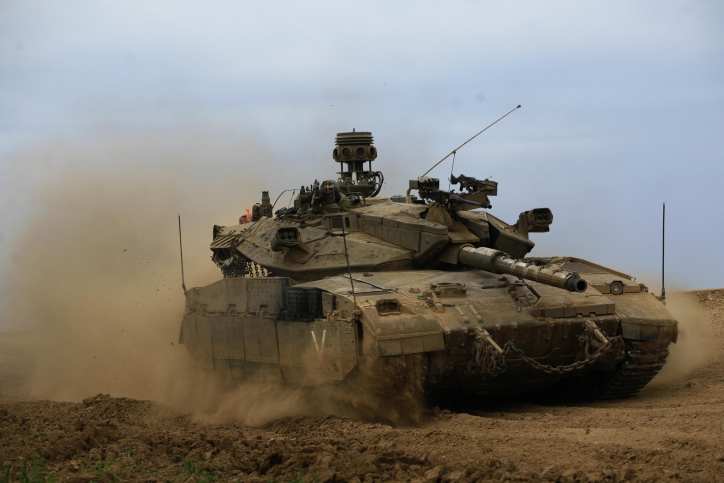
Operation “Protective Edge” is underway, and already the Israeli public feels a sense of deja-vu. Given similar operations in the past, it’s easy to predict what will happen over the next few days: the headlines will blare “The IDF prepares for a ground incursion”, while the Air Force will work overtime, reserves will be called up and the “Home Front” will be asked to “keep calm.” Meanwhile, Hamas will continue to make the lives of Israeli citizens in the south miserable, perhaps even giving residents of the country’s center a “taste” of the experience. The operation will end with the declaration that “deterrence has been restored”; the citizens of Israel will meantime take bets on when the next such outburst will happen.
Is this merry-go-round inevitable or is it possibly to defeat Hamas once and for all, thus permanently restoring peace to the south of the country? If the latter, then how?
Mida spoke with three experts with extensive experience in the defense and diplomatic arenas to see what they have to suggest.
If we have no choice – then go in all the way
Maj. Gen. (Res.) Yaakov Amidror, formerly head of the Israeli National Security Council and today a researcher at the BESA center for Strategic Studies, argues that Israel needs to take a gradual approach:
First, destroy as much terror infrastructure as possible without bringing in ground troops. If that doesn’t work, the army needs to go all in for an intensive and extended operation to entirely uproot all terrorist bodies – be they Hamas or Islamic Jihad. Per Amidror:
“Gaza has become a hornet’s nest on two counts: First, it is part of the array of forces making up the international Jihadi network and it has a strong foothold in the Sinai. Egyptian forces are fighting them fiercely, but their strength is limited. Second, Gaza itself has become the bastion of the Islamic Jihad and a host of other terrorist groups. Now, because of the many years in which they could smuggle in equipment freely, Hamas has reached the point that it can produce weapons locally.”
In light of past operations and the repeating scenarios, don’t you think a ground move should be sped up?
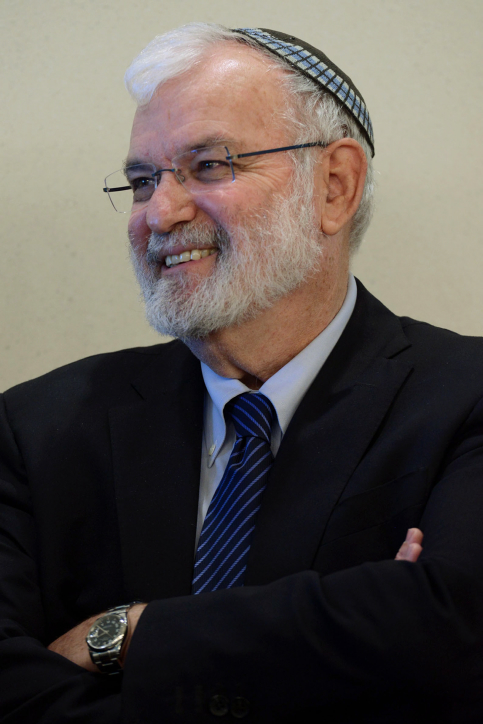
“True, it is possible to go into Gaza and gain control of it in a few days. Furthermore, I don’t think such an action would lead to heavy casualties, barring a disaster. But in order to entirely defeat terrorism, the IDF needs to conquer the whole Strip and not leave any territory in the hands of terrorists from which they can still fire. Such an action, of uprooting terrorism from the Gaza Strip, will take many months.
This is where it’s worth pointing out that Gaza is the most crowded place on earth with a million and a half people, including extensive underground tunnels dug as part of the lessons of past experiences. Therefore, if the state is not prepared to stay for at least a half a year, there’s no point to send in ground troops. It’s not an impossible move, but we need to appreciate the cost.
For this reason I don’t support a ground advance so long as the situation allows, but it may be that in the end we don’t have a choice. If we’re already going in – then all the way. If we make the mistake we made in Operation ‘Cast Lead’, that means we’ll pay the price and not gain anything.”
Assuming there is no choice and the troops moved in, do you think it will be possible to entirely uproot terrorism from the Gaza Strip and reach a point where the residents of the south will not suffer rocket barrages every few years?
“The answer is yes. If we conquer Gaza and thoroughly operate there for half a year, as I explained, eventually Gaza will be left without the ability to fire into Israel. The proof of this is Judea and Samaria [i.e. the West Bank], where there was a period where we dealt with the same situation. The second intifada broke out in September 2000. Not many remember today, but within a year and a half, Israelis died at the rate of about a hundred a month. Then head of the GSS Avi Dichter reached the point that he apologized to the Israeli public for the state not being able to provide them with security.
The situation in Judea and Samaria is now incomparably different. What led to that? A ground occupation operation in April 2002 [Operation Defensive Shield – E.G.]. Thus, within two years of activity, the number of killed went down to between 0 and 5 a year. Afterwards the Security Barrier was also built, but the main reason for the success was control of the ground, intelligence and operational freedom. It’s important to emphasize that acting in Gaza, even when you control it, is complicated. But it’s an achievable goal.”
What about political control in Gaza? Does Israel have an interest in returning the Palestinian Authority to the region?
“That is an interesting question. There are those who say that the Hamas regime in Gaza takes the Strip out of the Palestinian State equation, but in my opinion it won’t work. The Palestinian State, if it is established, will be established in Gaza as well. The attempt to have a policy of “divide and rule” is not realistic, because although we have partial control over such processes, at the end of the day, we don’t have the final say on the matter.”
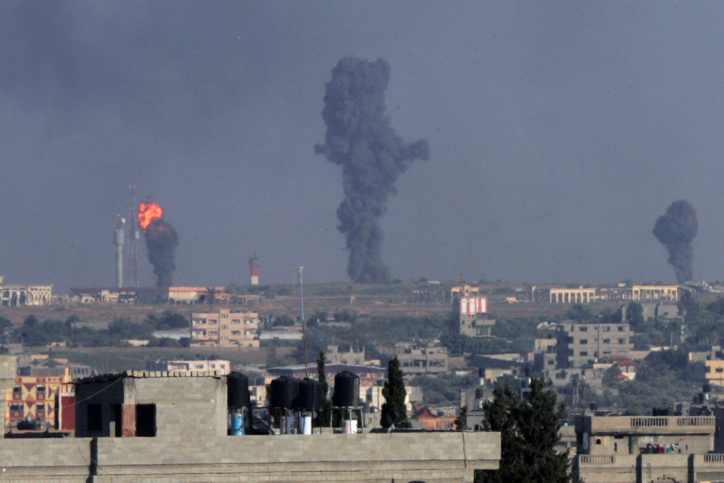
It’s Time to Cut Loose
According to Amidror, the Israeli interest is to isolate the Strip as much as possible:
“There is an assumption that if we cut ourselves off entirely from the Strip, we’ll be able to act freely against it. In my opinion this is a false conception. Israel will face fierce international criticism whether it acts militarily against an independent Gaza Strip or if it conquers part of Damascus after a Syrian attack, for instance.
We won’t get anything out of such a move. On the contrary, terrorist organizations will arm tenfold, and we will face far greater danger than we do today. Therefore, we cannot in any way allow terrorist organizations to freely bring in weapons to the Strip.”
But Col. (Res.) Yehuda Wegman, an expert in military doctrine and history, disagrees. “My approach is that we need to complete the disengagement, in all areas, and establish a border like with Syria and Lebanon,” he told Mida. In his opinion, “Israel doesn’t need an operation. It needs to treat Hamas like an enemy, like it states publicly.” This will come to pass by “cutting off the electricity and closing all the crossings.” In case you were wondering, before we could even ask, Col. Wegman added “there’s nothing to fear from global opinion, because we’re relying in this case on international law. They announce that they want to destroy us, and therefore we don’t have to provide them with a thing.”
But Ariel Sharon’s Disengagement wasn’t complete.

“True, and that’s precisely the point. We’re not supplying electricity to Hizballah headquarters in Beirut, but for some warped reason we’re supplying energy for Hamas’ weapons industry. It’s an intolerable state of affairs that shows that we may have left the Diaspora, but the Diaspora never left us.
In my opinion, we’re allowing them to establish themselves in a situation where we don’t know what we can and can’t do in the Strip. Right now, it is not a political entity, and we therefore feel uncomfortable in cutting off their electricity and water. When such a proposal is raised, you immediately cries of the premies in Gaza hospitals, and that the babies will die because there is no electricity […] that’s why I say we need to go all the way – let Hamas set up a political and military entity, establish a port, an airport and so on. But as long as they’re an “enemy state” they go under the rules of an enemy state, similar to that which applied to Egypt and Jordan before the peace treaties were signed and things changed.”
What about uncontrolled entry of arms? Wegman isn’t afraid of that, either: “The Syrians, Egyptians and Jordanians also had a great deal of firepower, much more than Hamas has, but three or four wars convinced them not to use it. We reached a boiling point with them, and they came to the conclusion that it’s not worth it for them.”
Does your approach not pull the rug from under the argument regarding the problematic nature of an armed Palestinian State in Judea and Samaria?
“It’s not the same thing. In the Gaza Strip, there’s a clear dividing line between Jews and Arabs, and we need to exploit it in full – like the border with Syria and Lebanon. There is no strategic benefit to controlling the territory in Gaza like there is in the Jordan Valley and Judea and Samaria. Therefore, we need to stress this line clearly, including when it comes to energy and food. Let them run their own life, with the aid of the whole world, who so loves to contribute to them. But the minute they try something, then as far as we’re concerned, it’s time for “free fire”. This way things will be clearer to both sides.”
In light of this, explains Wegman, there is no need to move in ground forces today, this “on condition you treat Gaza as an enemy entity for all intents and purposes. For instance, we supply energy and gas to Jordan and even to the Palestinian Authority, and that’s accepted. But anyone who declares that he wants to destroy you, shouldn’t be supplied with electricity and food. Only the warped Jewish mind can create such a situation.”
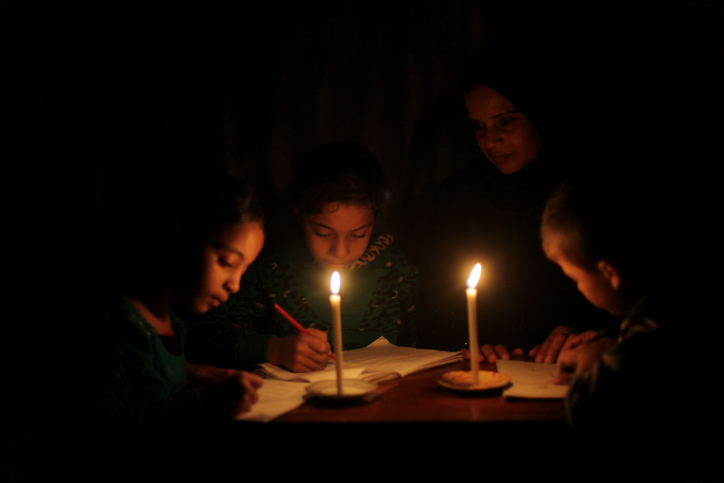
Hamas is Weak: All Conditions Are Ripe for a Large Scale Operation
In December 2013, Dr. Eitan Shamir, Lecturer in Bar-Ilan Univerity’s Political Science Department and researcher at BESA, took a stab at the subject, publishing a position paper entitled “Mowing the Grass – Israel’s Strategy for Protracted Intractable Conflict“. In this document, written with BESA head Prof. Efraim Inbar, the two argue that because Israel is in a protracted and intractable conflict with hostile non-state entities, its strategy is different than a standard inter-state conflict. Therefore, the use of force “is not meant to achieve unreachable political goals, but to limit the enemy’s ability to damage Israel as much as possible.” All that can be achieved therefore is temporary deterrence, and therefore Israel chose a patient strategy of wearing down the enemy.
This approach, Dr. Shamir explained to Mida, derives from the assumption that Hamas as a political-social phenomenon cannot be uprooted. But its military power can certainly be removed, in accordance with conditions on the ground.
Has Israel examined other options in the past, beyond temporarily weakening Hamas?

“In the plans of Southern Command, before ‘Cast Lead’, they spoke of three possible options. For our purposes, we’ll call them the ‘small’, ‘medium’ and ‘big’ options.
The ‘small’ option was that we go in [to the Strip], deal a ‘blow’ and get out – basically, what we did de-facto in Cast Lead, and even less in Pillar of Defense. The idea is to attack is a fairly surprising way and ‘cut the grass,’ in the sense that we harm Hamas’ strategic capabilities and assets, which took them time to build and accumulate. When they talk of the ‘erosion of deterrence’, they don’t think that Hamas suddenly forgot what happened a year or two ago. Rather, the organization rebuilds its capabilities, is ready for the call to arms, and then conditions change – for instance, internal pressure to act, competition with Jihadist organizations who apply pressure from “the Right” and so on. Then there is escalation or deterioration. The quiet that comes during the rebuilding is the ‘small’ option.
The ‘medium’ option, which has been discussed, is occupying the Philadelphi Corridor in order to prevent smuggling (we should remember that at the time the Egyptian government did nothing on the matter), as one of the serious problems in Gaza is that you have a territory controlled by a non-state organization, and this organization is supported by a state, or states, which provide it with equipment, training and weaponry. Now, if you succeed in isolating the area and ‘mow the grass’, then it won’t grow back anywhere near as much. It does grow at a rate we see in the Palestinian Authority [in the West Bank – A.W.], but this is peanuts compared to what is happening in the Strip, and certainly in Lebanon. The meaning of this option was much harder fighting and something of a return to Gaza, and it wasn’t followed through.
The ‘big’ and most ambitious option was to conquer the Strip, bring down Hamas and “crown” the Palestinian Authority as the ruler in the area. It’s important to stress that no-one spoke or is speaking today about a permanent Israeli presence in Gaza.”
But according to Dr. Shamir, reality has changed since the paper was written. A new regime hostile to Hamas has risen in Egypt, and because it acts aggressively against smuggling, the ‘medium’ option is now redundant. Now there is an optimal situation in which Hamas is exceptionally weak, without Egyptian backing and at odds with Iran and the Shia-Alawi axis in Syria. This isolation opens up the possibility “not just to ‘mow the grass’, but entirely uproot it, after which it will be very, very hard for them to rebuild their capabilities.” Beyond this, the rise of ISIL presents the possibility of presenting Hamas and other Jihadist organizations as all part of the same front. Done correctly, this can be a good way to rally public opinion behind Israel.
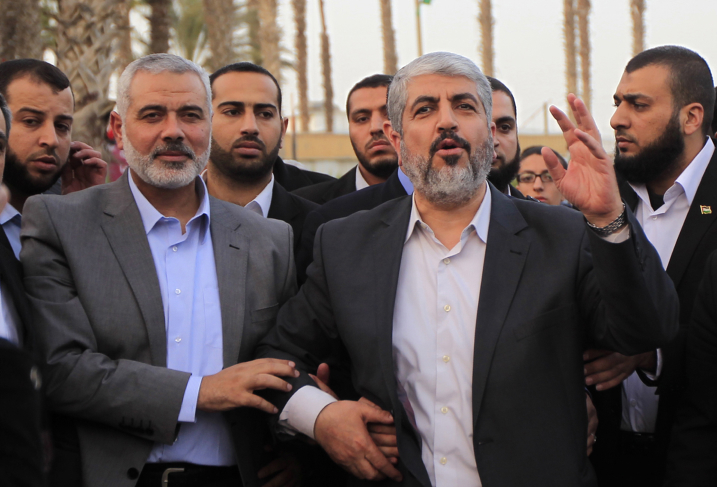
What do you think is the best option for Israel to grant Israel some security and peace and quiet?
“Assuming we’re not talking about bringing down Hamas, we should take the middle course, like a ‘Defensive Shield’ operation in Gaza – that is, a massive entry of two divisions which will “clean up” terrorism in Gaza and create long term deterrence. Nevertheless, we need to remember the problems that will come along with it – including international criticism, our relations with the Americans, which these days are already not at their best, and of course our own killed, which could reach 200-300 dead. By the way, by my evaluation the Israeli public is ready for such an operation, if it knows that it’s a significant and necessary one. Nothing is certain, of course, and one disaster could change everything. But in the end, if they would ask me what the best option is, I’d pick that one.”
“Another option is to wait a little and prepare a Pillar of Defense type plan, which will hurt Hamas assets from the air. But as I said before, this method will bring about the same dynamic – we’ll have a year or a year and a half of quiet – and then back again.”
Could such an action entirely prevent future firing at Israel?
“Imagine what someone from Israel in the 1950s and 1960s, when the Fedayeen were infiltrating from Gaza and Jordan, would answer to the question ‘When will it end?’. But eventually it did end. Everyone forgets that Arafat hit Kiryat Shemona with Katyushas for many years, and then, too, everyone asked ‘When will it end?’. In the reality of the Middle East, apparently part of us will always be threatened, and we need to navigate within that reality. Apparently there are no easy solutions.”
English translation by Avi Woolf.
To receive updates on new articles in English, join Mida on Facebook or Twitter or join our mailing list.



